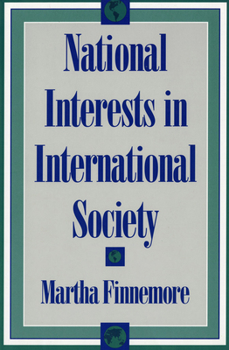National Interests in International Society
(Part of the Cornell Studies in Political Economy Series)
Select Format
Select Condition 
Book Overview
How do states know what they want? Asking how interests are defined and how changes in them are accommodated, Martha Finnemore shows the fruitfulness of a constructivist approach to international politics. She draws on insights from sociological institutionalism to develop a systemic approach to state interests and state behavior by investigating an international structure not of power but of meaning and social value. An understanding of what states...
Format:Paperback
Language:English
ISBN:0801483239
ISBN13:9780801483233
Release Date:September 1996
Publisher:Cornell University Press
Length:176 Pages
Weight:0.65 lbs.
Dimensions:0.5" x 6.2" x 9.3"
Age Range:18 years and up
Grade Range:Postsecondary and higher
Customer Reviews
2 ratings
It basically says "International Social Structure Matters"
Published by Thriftbooks.com User , 22 years ago
As the author mentions in the preface, National Interests in International Society is about defining national interests not about defending them that neorealists and neoliberals do the latter (p.xi). She starts her work by problematizing state interests and preferences since they cannot be considered as given. Then she begins to search for factors that shape state interests, preferences and policies. And finally she keeps international social structure, norms, international organizations and institutions as the most relevant causes of changing state preferences and interests. First of all, international social structure or social fabric of international system influences greatly states when they define their interests. Second, internationally hold norms and understandings about what is good and appropriate to change state policies. Internationally shared norms and values influence perception of interests and behavior of states without any external threats or domestic demands. States do not always know what they want. The normative context of international social structure helps states to define their national interests. Third, international organizations socialize states and teach states how to behave. They also shapes state interests. Moreover, international structure, normative context of international system and international organizations change over time and the change will also lead to changes in state preferences and interests. Finnemore develop these arguments through three case studies. In case of UNESCO, she demonstrates that internationally developed norm of science policy not their demand lead states to create science bureaucracies. In case of the International Committee of Red Cross (ICRC), however, Finnemore reiterates that war is highly regulated social institution and the norms regulating war change over time. Individuals rather than states led to the establishment of the ICRC that has a mission to govern the rules of war. In this process, principled concerns, morality and individual action mattered a lot that neorealist theory ignores these elements (p.87).In the case of the World Bank she emphasizes the importance of international organizations in determining international outcomes. The World Bank developed the norm of poverty and development in the early 1970s that changed a great deal states' perception and policies of economic development. In sum, National Interests in International Society has many insights for students of IR theory to understand the role of normative/social fabric of international system and international organizations in international politics.
A clear and concise explanation of constructivism
Published by Thriftbooks.com User , 24 years ago
The book gets straight to the point on some fairly complex issues, making it read quite well. One of the other reviewers apparently disagreed with Finnemore's political leaning, yet I dont see this as justification for giving it such a low rating. Finnemore explains throughout the book how Constructivism compliments previous International Relations theories. It may seem to have liberal leanings because IR liberals place emphasis on non-state actors, inparticular, institutions and regimes. This is unheard of in the realist world, in which, states are the only relavent actors. Finnemore examines three case studies where institutions were the method for reform to demonstrate that institutions can govern our preferences, and to give us insight into how they may change our preferences. Overall, well written, and to the point.





